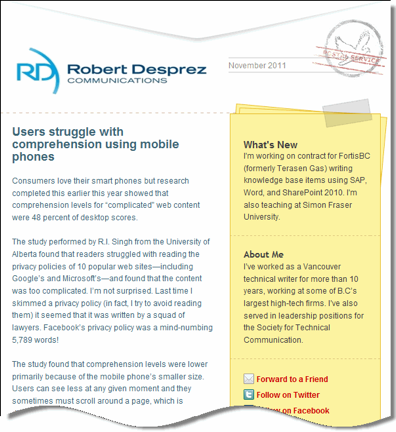Millions of people around the world are posting blog entries and commenting on those posts. But technical writers have remained on the sidelines by not letting our users comment on our content.
Here are three reasons you should enable commenting:
Reason #1: People are used to writing comments on blogs and web pages. Millions of people post blog posts. And thousands of us add our comments to those posts. For the most part, technical writers haven’t embraced this feature. I’d hazard a guess that most online help or even support web pages do not support user comments.
I recently read Clay Shirky’s book Cognitive Surplus. Shirky argues that in decades past North Americans spent a lot of time watching TV. But with the Internet, people are spending much less time passively sitting on the couch. We’re participating online writing blogs, creating YouTube videos, and writing and editing content on web sites like Wikipedia. Just a small change in how people spend their time can have astonishing changes in our world. He writes:
“Imagine that everything stays 99 percent the same, that people continue to consume 99 percent of the television they used to but 1 percent of that time gets carved out for producing and sharing. The connected population still watches over a trillion hours of TV a year; 1 percent of that is more than 100 Wikipedias worth of participation per year.”
So the Internet has revolutionized how we spend our free time. As citizens and consumers, we are actively contributing to content. But technical writers have remained on the sidelines by not letting our users comment on our content.
Reason #2: Collaboration helps create an online community. Collaboration offers a number of benefits:
* An online community can help each other share solutions, workarounds, and troubleshooting techniques. Technical writer and author Anne Gentle writes in her book Conversation and Community : “…a community of practice can form now that online tools speed up the process of teaching specific techniques and learning them from others.” Workers can spend about a third of their time looking for information. An online community is one of the ways that users can find information quickly.
* An online community builds goodwill among your users. If your company has seriously invested a lot of time and money in an online community with facilitators that respond helpfully and quickly, the company slowly builds positive goodwill among its users. Over time, your company may be recognized as an innovative provider of support―potentially a differentiator when compared to your competitors.
* An online community can improve your content. We all have blind spots. Maybe your online help doesn’t contain the key content that users need. Perhaps they’re looking for specifics on a difficult task. With an active and engaged community, it won’t be long before someone starts pointing out the missing pieces in your content.
Reason #3: Learning new skills for writers. Technical writers are used to interviewing SMEs, and drafting and editing content. By posting your documentation and acting as a facilitator for user comments, you may learn about blogging software and HTML (depending on which tool you use), and online diplomacy. Anne Gentle writes: “Consider becoming a moderator only after you have been a participant for a while. Most online communities do not recognize any sense of entitlement that you may have because of your employer. Instead you must earn the community’s trust and offer real help, even if you only provide links to your online help. Teaching the community to fish (for information) feeds them longer than just answering questions without citing how you learned the information yourself.”
Of course, I should point out that enabling commenting is no guarantee of documentation nirvana. You may be subject to spammers, your company needs to devote at least one person to monitor and respond to user comments, and you’ll probably notice that a minority of your users are the most likely to comment.
Here are a few examples of online documentation that encourages online discussions and comments:
Microsoft’s Developer Network is one of the first examples of community-contributed content.
http://msdn.microsoft.com/en-us/library/ff851953.aspx#6
Atlassian allows users to post comments on its documentation wiki.
http://confluence.atlassian.com/display/DOC/Confluence+Documentation+Home
On a related note, I wrote a blog entry about how to add comments to your documentation using third-party tools, such as Disqus and Wufoo.

 I have worked as a
I have worked as a